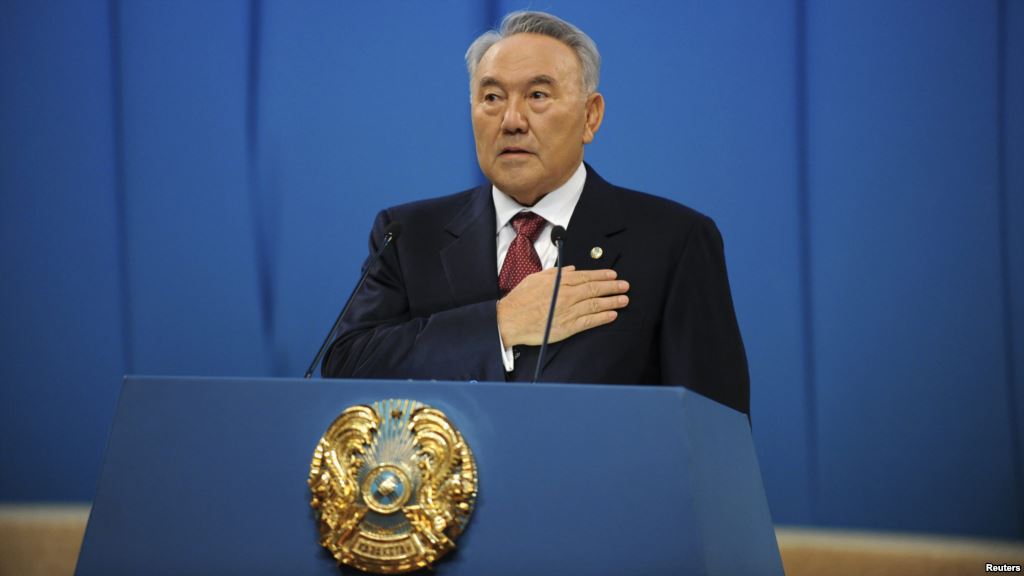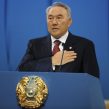
Nazarbayev’s State of Nation Address Reaffirms Bold Development Vision
Publication: Eurasia Daily Monitor Volume: 11 Issue: 20
By:

In his January 17 State of the Nation Address, Kazakhstani President Nursultan Nazarbayev reaffirmed the core long-term vision of stable economic development found in the “Kazakhstan-2050” national development strategy that he proposed in his December 2012 address. For example, the president wants to increase Kazakhstan’s per capita GDP 4.5 times, from $13,000 today to $60,000 in 2050, and propel Kazakhstan into the ranks of the world’s 30 most developed economies by then. Nazarbayev said that the government had already drafted a plan to achieve this objective, and that it would be approved after incorporation of the instructions contained in his address. (https://mfa.gov.kz/ru/#!/informatsiya_o_kazahstane/poslaniya_prezidenta_stranyi_narodu_kazahstana/kazahstanskiy_put_–_2050:__edinaya_tsel,_edinyie_interesyi,_edinoe_buduschee/).
Nazarbayev predicted that Kazakhstan would experience two broad development phases in coming decades. The first stage would last until 2030, when Kazakhstan should exploit what Nazarbayev sees as a “window of opportunity,” due to rising global prices for its main commodity exports, to construct a strong industrial sector and follow the successful modernization path of the East Asian “Tigers.” Between 2030 and 2050, the plans calls for Kazakhstan to develop a knowledge-based economy, produce more high-value-added goods and develop more advanced technologies based on post-petroleum energy sources.
Although many Western economists downplay the utility of national economic planning, Nazarbayev cited the successful examples of China, Malaysia and Turkey to justify his argument that, “Strategic planning is a ‘number one’ rule in the 21st century, because no wind will be favorable if a country does not know its route and destination harbor.” The president said Kazakhstan should use the standards and principles of the Organization for Economic Cooperation and Development (OECD) as “basic indicators of developed countries” and therefore as “a natural benchmark for Kazakhstan on our way to joining the top 30 developed nations of the world.” Through their modernization path, OECD members have achieved “high rates of investment, scientific research, productivity, a large share of small and medium-sized businesses and high standards of living.”
Nonetheless, Nazarbayev noted that “the concept of a ‘developed country’ is a category that changes over time.” Observing that, “There will be no ‘easy ride’ in the 21st century,” Nazarbayev described other challenges facing Kazakhstan in realizing its ambitious development goals. The president said that, “The process of achieving the goals for 2050 will proceed against the background of intense global competition…many well-known challenges, as well as numerous unexpected situations [such as] new crises in global markets and world politics.”
As noted by Majilis Speaker Nurlan Nigmatulin, the address “specifies both long-term milestones of the Kazakhstan 2050 Strategy realization and specific steps in all priority development fields” (Kazinform, January 17). Nazarbayev emphasized that the strategy should aim to improve peoples’ lives on a constant basis, rather than focusing national attention exclusively on achieving goals decades ahead. This approach presumably aims to provide constant rewards and incentives for people to execute its policies, as well as to provide intermediary benchmarks to assess progress.
For example, Nazarbayev directed the government to try to realize a 6–7 percent national growth rate this year (slightly above the figure for 2013), prepare a plan for selling off major state assets by 2016 by the end of March 2014, and develop measures to further reduce the national inflation rate to 3-4 percent in coming years. Last year, according to the State Agency for Statistics, the rate was the lowest in 15 years, at 4.8 percent (Tengri News, January 17).
The president devoted some time to explaining why the country needed to develop a civilian nuclear energy industry. He argued that the global demand for nuclear power would continue to increase; that it generates clean energy that does not contribute to global climate change; that using domestic nuclear energy would free more of Kazakhstan’s natural gas for export or for manufacturing higher-value petroleum products; and that Kazakhstan has a good foundation for a nuclear power industry, given its status as the world’s largest source of natural uranium. Last year, Kazakhstan again had the largest share of the world’s uranium production, with more than 38 percent of global output (World Nuclear News, January 27).
Accordingly, Nazarbayev instructed the government to decide by the end of March 2014 where the country’s first new post-Soviet nuclear power plant should be located and how it should be financed. Furthermore, he called for steps to transform Kazakhstan into a “green economy” by, for example, constructing the infrastructure to allow the widespread use of electric cars.
Terming the country’s current import of refined petroleum products such as diesel fuel, gasoline, and jet fuel “ridiculous,” Nazarbayev also endorsed plans to construct Kazakhstan’s fourth oil refinery (Tngri News, January 17). KazMunaiGas National Oil and Gas Company had earlier announced it would complete its feasibility study on a fourth refinery by 2015. Since the three existing oil refineries in Atyrau, Pavlodar and Shimkent are undergoing comprehensive upgrades, the country might not need a fourth refinery until 2025 (Tengri News, December 26, 2013).
The national media carried many statements from prominent Kazakhstanis and foreign experts endorsing the address. For example, the Chairman of the Kazakh Space Agency (KazCosmos), Talgat Mussabayev, said that his team was enthusiastic about the president’s idea of developing the country’s nanotechnolgy, gene engineering, post-petroleum and space sectors (Kazinform, January 17). Kazakhstani political scientist Sain Borbassovsaid that the president’s instructions to the government and local authorities to establish a favorable environment for the development of small and medium-sized business and agriculture would help expand the country’s middle class, a prerequisite for Kazakhstan to become a leading developed country (Kazinform, January 20). Nazarbayev’s call to promote the “Mangilik Yel” (‘Eternal Nation”) as the national idea of Kazakhstan was reported to have won praise from young people, leaders of the Russian ethnic minority and others who agreed that the country’s continued inter-ethnic harmony and committed patriotism would prove essential for realizing the ambitious goals of Kazakhstan-2050 (Kazinform, January 17).




